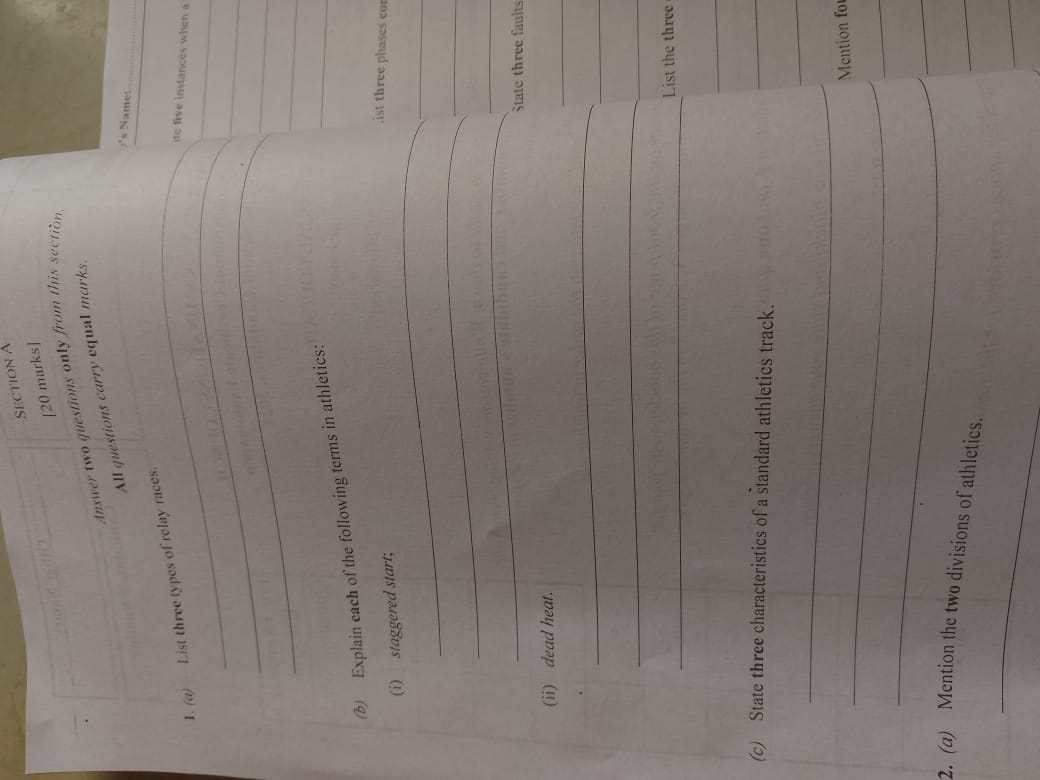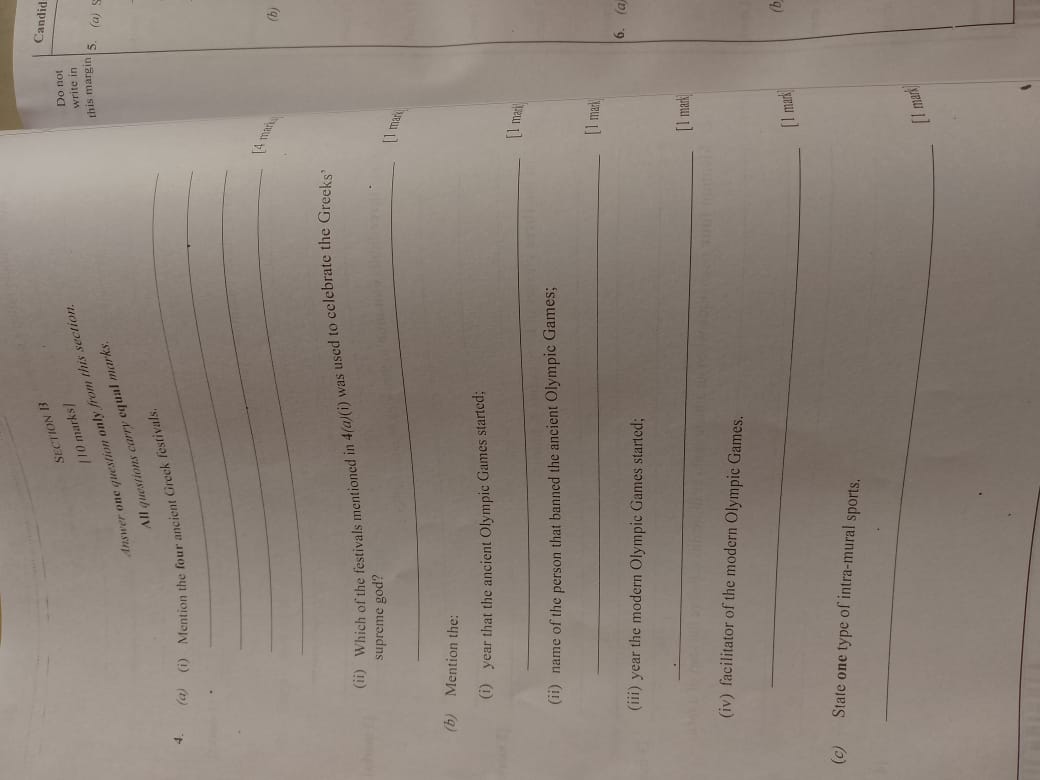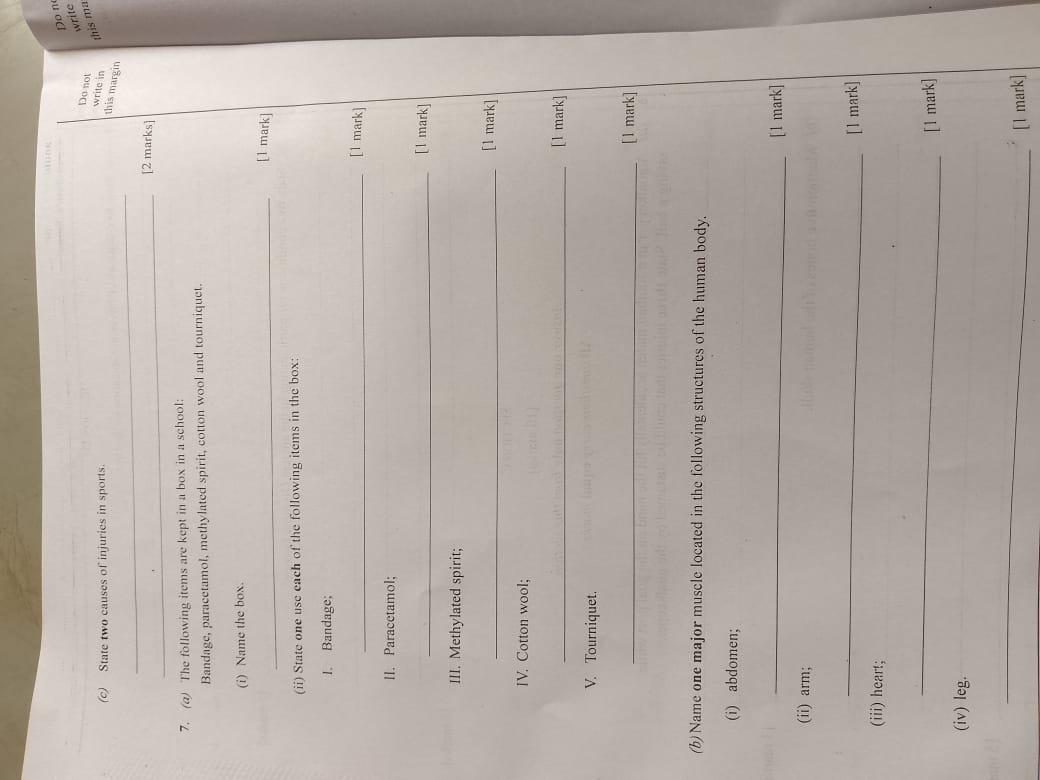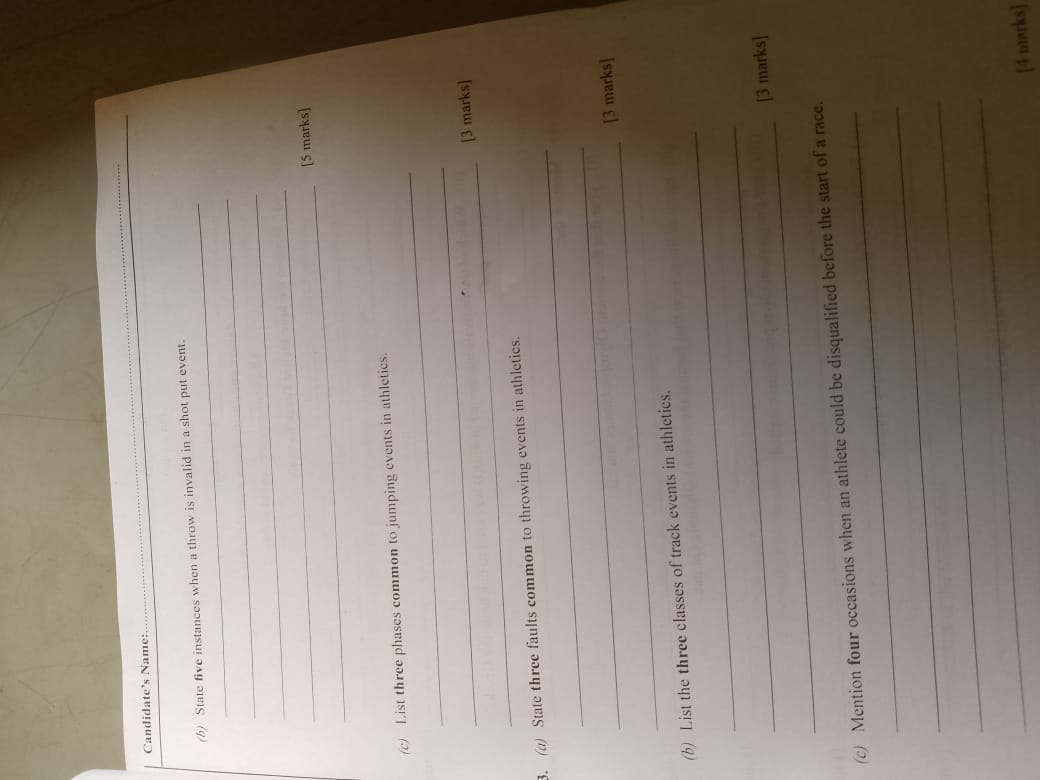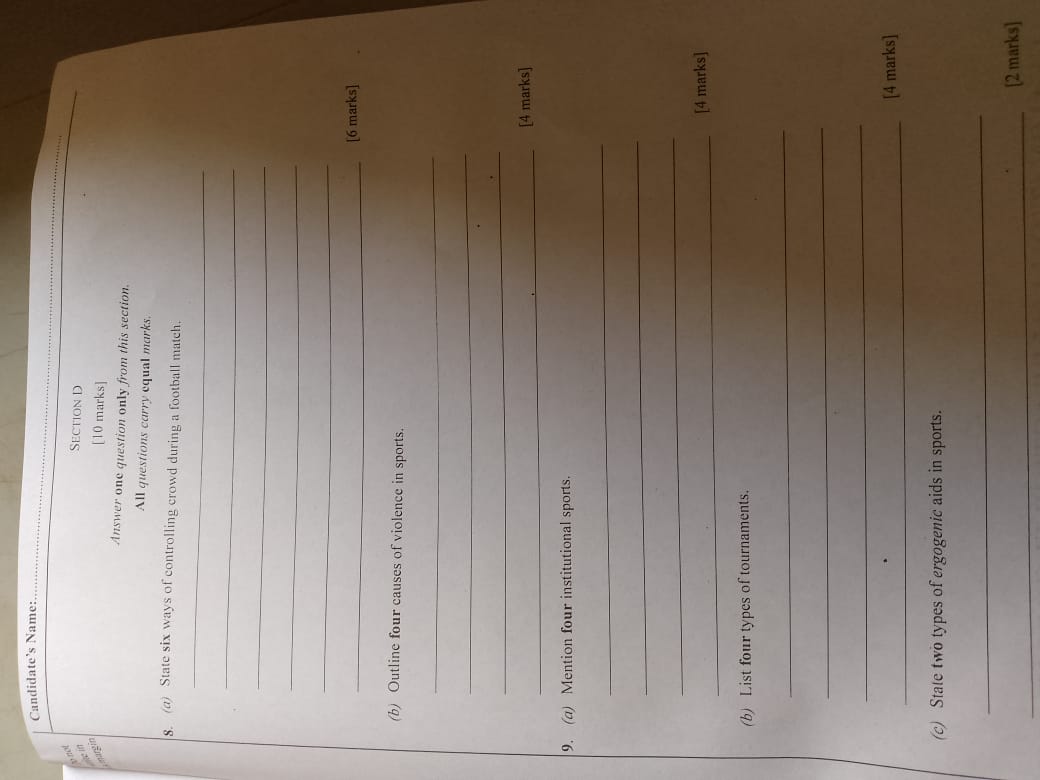Join Our Telegram Channel
Join Our Whatsapp Group
WAEC Physical Education 2024 Answers, Here, we will be providing you the correct question on Physical Education waec 2024, WAEC Physical Education Answers 2024. WAEC 2024 Physical Education obj, 2024 WAEC Physical Education obj and Essay Answers,
Friday, 10th May, 2024
Physical Education 2 (Essay) 9:30am – 10:50am
Physical Education 1 (Objective) 10:50am –
PHYSICAL EDUCATION
1-10: ADDDBDBAAC
11-20: BBABCDBBBC
21-30: BBCBACBCCD
31-40: CABBDCBCBA
41-50: ACBBDCCBBA
(1a)
(PICK ANY THREE)
(i) 4x100m relay
(ii) 4x400m relay
(iii) Distance medley relay
(iv) Sprint medley relay
(v) Shuttle relay
(1bi)
Staggered start:
In a staggered start, the runners in a race are positioned at different starting points, with the outer lanes having a head start compared to the inner lanes. This is done to ensure that all runners cover the same distance during the race, as the inner lanes have a shorter distance to the finish line compared to the outer lanes.
(1bii)
Dead heat:
A dead heat is a situation in a race where two or more competitors finish the race at exactly the same time, resulting in a tie. In such cases, the competitors are declared joint winners, and no one is declared the outright winner.
(1c)
(PICK ANY THREE)
(i) A standard athletics track is 400 meters in length, with a circumference of approximately 400 meters.
(ii) Each lane on the track is typically 1.22 meters (4 feet) wide.
(iii) The track surface is usually made of a synthetic material, such as rubberized asphalt or a polyurethane compound, providing a consistent and durable surface for athletes.
(iv) The lanes on the track are not straight but curved, with a slight incline on the outer lanes to accommodate the centrifugal forces experienced by runners.
(v) The starting and finishing lines are clearly marked on the track, with the starting line being a straight line across the track, and the finishing line being a straight line perpendicular to the running direction. straight sections and two curved sections
(2a)
(PICK ANY TWO)
(i) Track events
(ii) Field events
(iii) Combined events
(iv) Race walking
(2b)
(PICK ANY FIVE)
(i) The shot touches the ground outside the throwing circle.
(ii) Any part of the thrower’s body touches the top of the rim or the ground outside the circle during the throw.
(iii) The shot lands outside the sector lines.
(iv) The thrower leaves the circle before the shot has landed.
(v) The thrower uses any technique that is not in accordance with the rules.
(vi) The thrower fails to pause before the start of the throw.
(2c)
(PICK ANY THREE)
(i) Approach
(ii) Takeoff
(iii) Flight
(iv) Landing
(v) Recovery
(3a)
(PICK ANY THREE)
(i) Stepping outside the throwing circle or runway during the throw
(ii) Releasing the implement before the start of the throw
(iii) Using an improper throwing technique
(iv) Failure to pause before the start of the throw
(v) Failure to keep the implement within the sector lines during the throw
(3b)
(PICK ANY THREE)
(i) Speed
(ii) Endurance
(iii) Power
(iv) Agility
(v) Coordination
(vi) Technique
(3c)
(PICK ANY THREE)
(i) False start
(ii) Failure to report to the call room on time
(iii) Improper uniform or equipment
(iv) Unsportsmanlike conduct
(v) Doping or use of banned substances
(vi) Failure to comply with the rules or instructions of the officials
(4ai)
(PICK ANY FOUR)
(i) The Olympian Games
(ii) The Pythian Games
(iii) The Nemean Games
(iv) The Isthmian Games
(v) The Panathenaic Festival
(vi) The Eleusinian Mysteries
(4aii)
The Olympian Games were used to celebrate the Greek supreme god, Zeus.
(4bi)
The ancient Olympic games started in 776 BC.
(4bii)
The ancient Olympic games were banned by Roman Emperor Theodosius I.
(4biii)
The modern Olympic games started in 1896.
(4biv)
The International Olympic Committee (IOC) is the facilitator of the modern Olympic games.
(4c)
(PICK ANY ONE)
(i) Basketball
(ii) Swimming
(iii) Badminton
(iv) chess
(5a)
(PICK ANY FIVE)
(i) Improving physical fitness, strength, endurance, and coordination.
(ii) Acquiring and refining motor skills and techniques for various sports.
(iii) Understanding rules, strategies, and the principles of different sports.
(iv) Promoting teamwork, communication, and sportsmanship.
(v) Building self-confidence, discipline, and resilience.
(vi) Providing opportunities for enjoyment, relaxation, and lifelong participation in physical activities.
(vii) Encouraging a healthy lifestyle and promoting physical, mental, and overall well-being.
(5b)
(PICK ANY FIVE)
(i) Being a Greek citizen (male)
(ii) Not being a slave
(iii) Not being a woman (except for the Vestal Virgins who participated in the opening ceremonies)
(iv) Undergoing extensive training and preparation
(v) Swearing an oath to compete with honor and integrity
(vi) Paying a substantial entry fee
(6a)
(PICK ANY THREE)
(i) Fracture of the wrist or forearm bones (radius and ulna)
(ii) Dislocation of the wrist joint or shoulder joint
(iii) Soft tissue injury (bruising, swelling, and pain) to the hand, wrist, or forearm
(iv) Sprain or strain of the wrist or hand muscles
(V) Nerve damage or compression (e.g., carpal tunnel syndrome)
(6b)
(PICK ANY FIVE)
(i) Frontal bone
(ii) Parietal bone
(iii) Occipital bone
(iv) Temporal bone
(V) Sphenoid bone
(Vi) Ethmoid bone
(Vii) Mandible (jawbone)
( 6c)
(PICK ANY TWO)
(i) Overuse or repetitive strain: This occurs when an athlete performs a particular movement or action repeatedly, leading to fatigue and stress on the muscles, tendons, and joints.
(ii) Trauma or direct blows: This occurs when an athlete receives a direct blow or impact to a specific area of the body, such as a collision with another player or a fall to the ground.
(iii) Poor training or preparation: This occurs when an athlete does not adequately prepare or train for a sport or activity, leading to inadequate conditioning, flexibility, and strength.
(iv) Environmental factors: This includes factors such as extreme weather conditions (e.g., heat, cold), uneven or slippery playing surfaces, and inadequate equipment or safety gear.
(7ai)
First Aid Kit
(7aii)
(I)Bandage: Used for wrapping wounds or injuries to provide support and compression.
(II)Paracetamol: Used as a pain reliever and fever reducer.
(III)Methylated spirit: Used as an antiseptic to clean and disinfect wounds or surfaces.
(IV)Cotton wool: Used for applying medications or cleaning wounds.
(V)Tourniquet: Used to temporarily stop severe bleeding by applying pressure to a limb.
(7b)
(i) Abdomen: Rectus abdominis
(ii) Arm: Biceps brachii
(iii) Heart: Myocardium (heart muscle)
(iv) Leg: Quadriceps femoris
(8a)
(PICK ANY SIX)
(i)Adequate security presence
(ii)Physical barriers like fences or barricades
(iii)Effective communication with the crowd
(iv)CCTV surveillance
(v)Staggered entry and exit times
(vi)Alcohol restrictions
(vii)Designated seating areas for different fan groups
(8b)
(PICK ANY FOUR)
(i)Intense rivalry between teams or supporters
(ii)Poor officiating or controversial decisions
(iii)Alcohol or substance abuse by spectators
(iv)Historical grievances between fan bases
(v)Poor crowd management or inadequate security measures
(9a)
(PICK ANY FOUR)
(i)Collegiate sports (e.g., NCAA in the US)
(ii)Professional sports leagues (e.g., NBA, NFL)
(iii)Military sports competitions
(iv)Corporate sports leagues
(v)Government-sponsored sports programs
(9b)
(PICK ANY FOUR)
(i)Knockout tournaments
(ii)Round-robin tournaments
(iii)League tournaments
(iv)Invitational tournaments
(v)Multi-stage tournaments
(9c)
(PICK ANY TWO)
(i)Anabolic steroids
(ii)Creatine supplements
(iii)Beta-alanine supplements
(iv)Caffeine
(v)Blood doping
Answers Loading...
